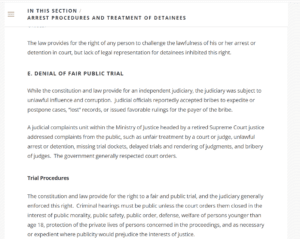The 2022 United States Department Human Rights report on Ghana has said that lengthy pretrial detention remained a serious problem in the West African country.
According to the report, the government kept prisoners in extended pretrial detention, up to many months, due to police failure to investigate or follow up on cases, case files lost when police prosecutors rotated to other duties every three years, slow trial proceedings marked by frequent adjournments, detainees’ inability to meet bail conditions that were often set extremely high even for minor offenses, and inadequate legal representation for criminal defendants.
The length of pretrial detention exceeded the maximum sentence for the alleged crime in some instances, it said.

“Judicial authorities struggled to implement a case tracking system begun on a trial basis in seven regions.
“The system tracked cases from initial arrest to remand custody in the prisons, prosecution in the courts, and incarceration or dismissal, but was not widely implemented or adopted. Barriers included poor internet connectivity and a lack of equipment at Legal Aid Offices.
“The law provides for the right of any person to challenge the lawfulness of his or her arrest or detention in court, but lack of legal representation for detainees inhibited this right,” the report stressed.
Regarding denial of fair public trials, the report indicated that while the constitution and law provide for an independent judiciary, “the judiciary was subject to unlawful influence and corruption.
“Judicial officials reportedly accepted bribes to expedite or postpone cases, “lost” records, or issued favorable rulings for the payer of the bribe.
“A judicial complaints unit within the Ministry of Justice headed by a retired Supreme Court justice addressed complaints from the public, such as unfair treatment by a court or judge, unlawful arrest or detention, missing trial dockets, delayed trials and rendering of judgments, and bribery of judges. The government generally respected court orders,” it said.
The constitution and law provide for the right to a fair and public trial, and the judiciary generally enforced this right, the report further stated.”Criminal hearings must be public unless the court orders them closed in the interest of public morality, public safety, public order, defense, welfare of persons younger than age 18, protection of the private lives of persons concerned in the proceedings, and as necessary or expedient where publicity would prejudice the interests of justice,” it suggested.
“Although defendants have the right to an attorney at public expense if unable to pay, most indigent accused persons represented themselves in court. Defendants have the right not to be compelled to testify or confess guilt, although generally defendants are expected to testify if the government presents sufficient preliminary evidence of guilt.
“In July parliament passed a law permitting the use of plea bargaining for most crimes. As of September, the attorney general had not issued guidance to prosecutors or defense attorneys on how to implement the law.”
By Laud Nartey|3news.com|Ghana


